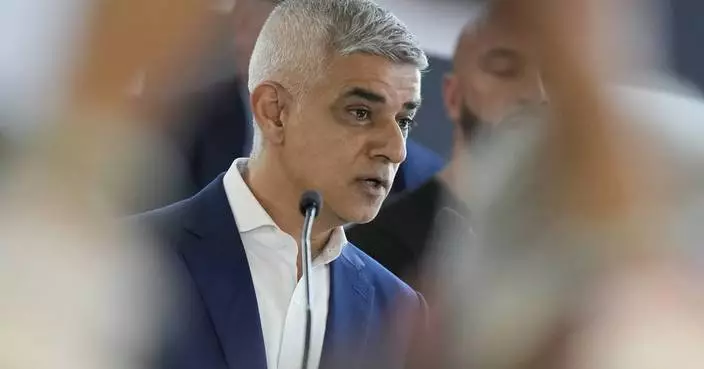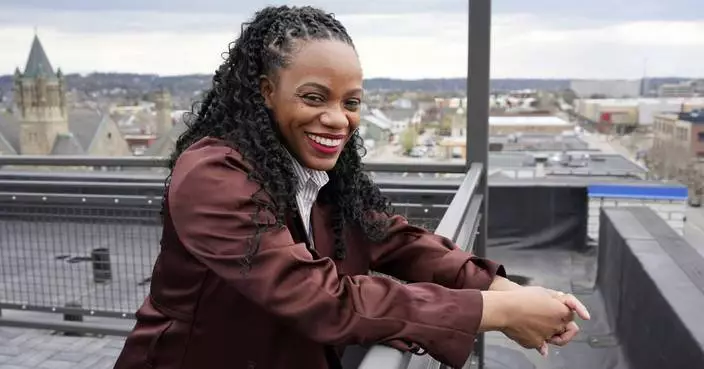Angela Tuffnell has spent years battling ‘invisible’ varicose veins hidden in her pelvis.
A model has opened up about the agonising condition that left her feeling like she was “constantly in labour” – prompting her to self-fund a hysterectomy in a desperate bid to be free of pain.
Click to Gallery
Angela Tuffnell has spent years battling ‘invisible’ varicose veins hidden in her pelvis.
Now though, following another bout of surgery in August 2017, Angela – mum to law Masters student Harriet, 24, and model Grace, 21 – is finally pain free, and has even been able to return to modelling after being forced to put her career on hold.
She continued: “Facing this has been the biggest battle of my life but thank goodness I had the tenacity to keep fighting.
Then, in 2010, she started to feel unwell.
At her worst, she would pass out and vomit because of the pain in her pelvis.
“It really is an invisible illness. It’s not a known condition at all, hence why I want to share my story.”
Angela Tuffnell, 57, of Cheshire, has spent years battling varicose veins hidden inside her pelvis. At points, it was so severe she could scarcely stand, and would pass out from the pain.
Close to breaking point because of her illness – pelvic congestion syndrome (PCS) – she even paid for a hysterectomy, but sadly that had little effect.

Angela with her daughter Harriet and granddaughter Aurora (PA Real Life/Collect)
Now though, following another bout of surgery in August 2017, Angela – mum to law Masters student Harriet, 24, and model Grace, 21 – is finally pain free, and has even been able to return to modelling after being forced to put her career on hold.
She said: “The only way I can describe the pain is like a constant, long, slow labour. At points, I actually thought I was dying.
“At first, I thought it was just age catching up with me, but now I know I had actually been walking round with this condition for years.”

Angela with her boyfriend Bill (PA Real Life/Collect)
She continued: “Facing this has been the biggest battle of my life but thank goodness I had the tenacity to keep fighting.
“Doctors cannot be sure of the cause of PCS, but after I enquired, they told me it can be genetic, or the result of an underlying condition exacerbated by a pelvic trauma such as childbirth.”
For years, Angela was symptom free – aside from a small faulty vein on the inside of her right knee, which she had laser treatment for.

Angela (PA Real Life/Collect)
Then, in 2010, she started to feel unwell.
“The pain was a gradual build,” she said. “I’d always been very sporty and active, but suddenly I was feeling very tired and worn.
“I’d get terrible back ache and found standing for more than five minutes a struggle.”
Over the next two years, Angela’s condition deteriorated more and more.

Angela with Grace, Harriet and Aurora (PA Real Life/Collect)
At her worst, she would pass out and vomit because of the pain in her pelvis.
In a bid to find out what was causing her agonising symptoms, she underwent a string of hospital tests, but initially, doctors were baffled.
Then, in December 2012, she was referred to a vascular specialist, and underwent a transvaginal scan. Two months later, she had her PCS diagnosis.
“I’d never heard of it before,” said Angela, who has been with her boyfriend Bill, 63, around six months after the pair met at the gym. “The tricky thing is that these veins are internal, so not actually visible.
“I wasn’t walking round with bulging veins on my body. When you look at me, you’d never know anything was wrong.

Angela is now speaking out to raise awareness of PCS (PA Real Life/Collect)
“It really is an invisible illness. It’s not a known condition at all, hence why I want to share my story.”
It is still not known what exactly causes PCS, but it occurs because of varicose veins – swollen, enlarged veins, which may be dark purple, bulging or twisted in appearance – in the lower abdomen, which then stop normal blood circulation to the pelvic organs.
According to a report by The Whiteley Clinic and B Consulting and Boston Scientific, for which almost 100 female sufferers were surveyed, it is difficult to detect, with the average patient having 16 GP appointments before diagnosis, and some undergoing as many as 13 diagnostic tests across a four-year period.
In January 2014, Angela underwent the first of two pelvic vein embolism (PVE) procedures, where metal coils are inserted to block faulty veins and stop abnormal blood flows. However, it did little to numb her pain.
She recalled: “Even standing still, I’d be in agony. The throbbing pain was so bad I’d need to lie down, and it’d take hours to stop.
“I could feel the life ebbing out of me, and nobody could help.”
Desperate, Angela paid for a private hysterectomy in August 2014, before undergoing a second PVE in January 2015 when that proved to be unsuccessful.
This time, though, she felt strong enough post-surgery to be able to return to her job as a model and makeup artist, having previously semi-retired whilst she dealt with her condition.
For two years, life ticked along as normal and she believed she was cured– until July 2017, when her pain returned.
“This time, I knew I wasn’t alone. I was armed with knowledge about the condition, and I knew I wanted the best care possible,” she said.
After researching her options online, she booked a consultation at The Whiteley Clinic, who offer expert treatment in vein-related conditions and have practices in Bristol, Guildford and London.
There, medics confirmed that she was still living with PCS, and also had a large, internal varicose vein in her leg.

Angela on holiday (PA Real Life/Collect)
She continued: “All it took was that initial consultation, and the rest is history. My sonographer Judy Holdstock assessed me, and said I was one of the worst cases she’s ever seen. I was classed as chronic.”
In August 2017, Dr David Beckett carried out Angela’s third and final PVE, taking care to bypass the work previously done.
Now, following a procedure to her leg in January 2018, she is happily pain free, having returned to work full-time.
Sharing her story for the first time, she is determined to speak out to raise awareness of PCS, and spare other women her pain.
She said: “For years, I was juggling being a mum, studying, working, and this awful condition. At points, I was close to a breakdown, but I’ve moved forward now.
“I always swore I’d help other women with every aspect of PCS when I was strong enough.
“I want this condition to be on people’s radars so they realise that if you’re feeling pain and exhaustion, if you’re feeling literally drawn to the floor, if you’re looking for the nearest chair whenever you enter a room because you can no longer stand, it could well be PCS.”
She added: “I never gave up and I hope that other women out there with symptoms of PCS know that their voices can and will be heard.”
LONDON (AP) — Millions of voters in England cast ballots Thursday in an array of local elections, the last big test before a looming U.K. general election that all indicators suggest will see the Labour Party return to power after 14 years in the wilderness.
Prime Minister Rishi Sunak was barely able to point to any big success for his Conservative Party, confirming that the electoral coalition that gave the party a big win in the 2019 general election has frayed, if not completely dissolved, in the wake of a series of political dramas and the cost of living crisis.
For Labour leader Keir Starmer, the results provided confirmation of what opinion polls have shown for two years — that Labour has recovered from its 2019 low and is on course to win the election comfortably.
Here are five things we learned:
It's possible.
Though the Conservatives lost around half the 1,000 council seats they held, and suffered a huge defeat in the special parliamentary election in Blackpool South, a coastal resort town in the northwest of England, it looks as though Sunak will not face a revolt just yet from anxious lawmakers in his party.
That's largely because the Conservative candidate in the mayoral contest in Tees Valley in the northeast of England hung on, albeit with a much depressed vote. That helped soothe some concerns despite losses elsewhere.
However, the defeat of the Conservative incumbent mayor in the West Midlands could prompt another bout of jitters among lawmakers increasingly concerned about their ability to hold onto their seats in a general election. Sunak is under pressure from different wings of the party to go further right or move to the center.
Overall, the results show that Sunak hasn't improved the Conservatives’ overall position following the damage caused by the actions of his predecessors, Boris Johnson, who was effectively ousted, and then replaced by Liz Truss, whose tenure lasted only 49 days after her economic policies rocked financial markets.
Probably in the fall.
In the U.K., the date of the general election rests in the hands of the prime minister. It has to take place by January, and Sunak has repeatedly said that his “working assumption” was that it would take place in the second half of 2024.
Though that theoretically could take place as soon as July, most Conservative lawmakers have indicated that the best time would be in the fall, when recent tax cuts may register with voters, inflation has fallen further, and interest rates may have been cut — helping to fuel an economic feelgood factor.
Waiting till the fall may also give the government a chance to cut taxes again in another budget. Conservatives will also be hoping that the controversial plan to send some asylum-seekers to Rwanda will have got off the ground and that there is evidence that it is acting as a deterrent for those seeking to make the dangerous crossing in small boats across the English Channel from France to England.
It looks like it.
In historical terms, Labour has a mountain to climb, if it’s going to form the next government. Its performance at the last general election in 2019 was its worst since 1935. Starmer has tried to bring the party back to the center of U.K. politics after the leadership of veteran left-winger Jeremy Corbyn.
Starmer’s approach has clearly worked if Thursday's results are anything to go by. Labour won control of councils in England that the party hasn’t held for decades, and was successful on a massive swing away from the Conservatives in Blackpool South, which if repeated at the general election would lead to a big majority.
Labour won in areas that voted for Britain’s departure from the European Union in 2016 and where it was crushed by Brexit-backer Johnson, such as Hartlepool in the northeast of England, and Thurrock in southeast England. It also seized control of Rushmoor, a leafy and military-heavy council in the south of England where it had never won, showing that it has a broad base of support.
It’s fair to say that enthusiasm levels are far lower than those that heralded the arrival of Labour's Tony Blair before the 1997 general election.
That may be partly because of the more challenging economic backdrop, but Starmer, formerly a human rights lawyer, lacks the razzmatazz of Blair.
It'll be tough.
One of the contributing factors to Blair’s landslide victory in 1997 came from so-called tactical voting, whereby some voters put aside their political preference and vote for whoever has the best chance of defeating the party they oppose the most. In 1997, that was the Conservatives.
Tactical voting has reemerged and was evident somewhat in Thursday's elections where Conservative candidates lost out to other parties, not just Labour, but also to the centrist Liberal Democrats and also to the Green Party.
The Conservatives may also be outflanked from the right, with Reform U.K. poised to stand candidates across Britain. In Thursday's elections, it was a minimal presence but where the party did stand, it clearly took votes away from Conservative candidates. That was notable in Blackpool South, where the Reform candidate was just shy of usurping the Conservatives into second.
Should Reform, which claims to be tougher on issues such as immigration and on Brexit, do as well in a general election, then it could lead to other parties, notably Labour, defeating Conservatives.
It certainly looks like it.
In some areas with large Muslim populations, such as Blackburn and Oldham in northwest England, Labour candidates appear to have suffered as a result of the leadership’s strongly pro-Israel stance over the conflict in Gaza.
Labour's vote share was clearly impacted, but the effect on its performance in a general election remains unclear, as those seats with a big Muslim population generally have big Labour majorities.
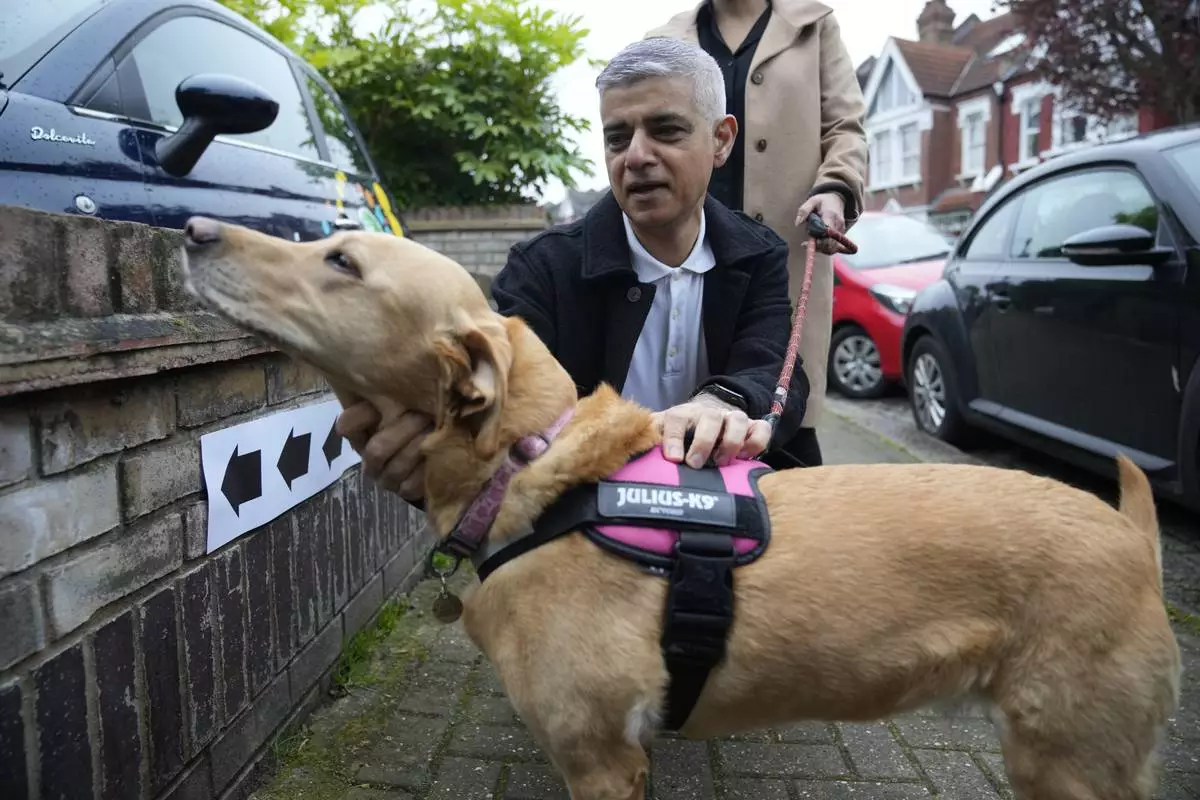
London Mayoral Labour Party candidate Sadiq Khan pats his dog Luna as they pose for the media he arrives to vote in London, Thursday, May 2, 2024. Khan, is seeking re-election, and standing against 12 other candidates for the post of Mayor of London. There are other Mayoral elections in English cities and as well as local council elections. (AP Photo/Kin Cheung)
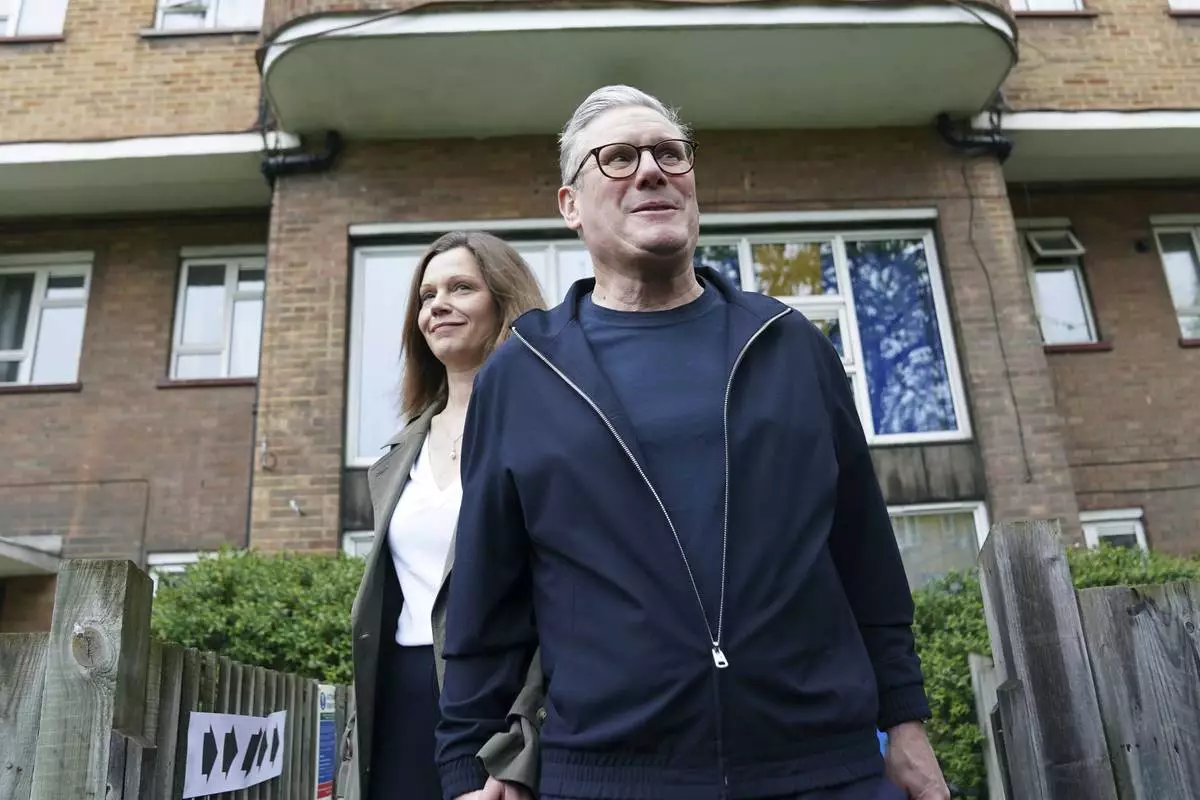
Britain's Labour leader Keir Starmer and his wife Victoria leave the polling station in his Holborn and St Pancras constituency, after casting their votes in the local and London Mayoral election, in north London, Thursday May 2, 2024. (Stefan Rousseau/PA via AP)

Counting begins at the Blackpool South by-election at Blackpool Sports Centre in Blackpool, England, Thursday, May 2, 2024. The by-election was triggered after the resignation of Scott Benton. (Peter Byrne/PA via AP)
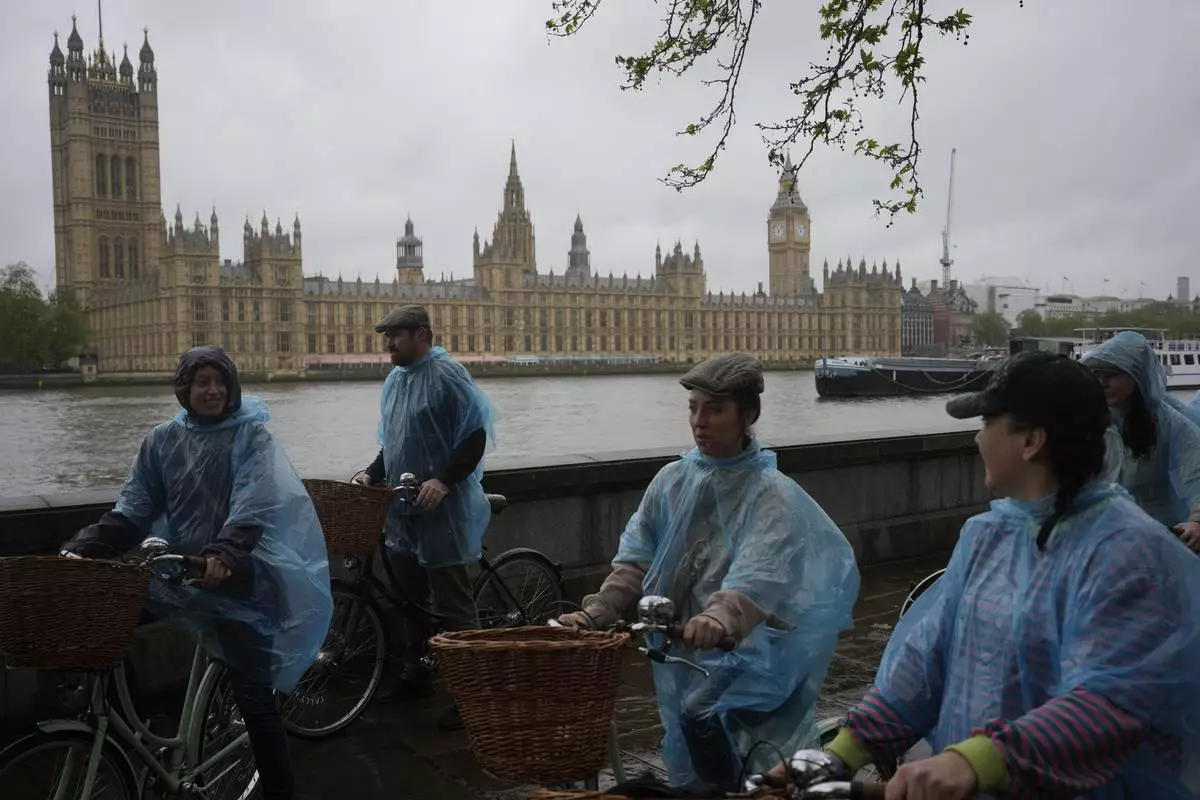
Tourists on a cycle tour in wet weather plastic macs, cycle past the Houses of Parliament, in London Friday, May 3, 2024. Britain's governing Conservative Party is suffering heavy losses as local election results pour in Friday, piling pressure on Prime Minister Rishi Sunak ahead of a U.K. general election in which the main opposition Labour Party appears increasingly likely to return to power after 14 years. (AP Photo/Kin Cheung)

Conservative party candidate Lord Ben Houchen, left, with Britain's Prime Minister Rishi Sunak following his re-election as Tees Valley Mayor in Teesside, England, Friday May 3, 2024. (Owen Humphreys/PA via AP)

Britain's Labour Party leader Sir Keir Starmer with newly elected East Midlands mayor Claire Ward during a visit to Forest Town Arena in Mansfield, England, Saturday May 4, 2024. (Jacob King/PA via AP)

Britain's Labour Party leader Sir Keir Starmer, center, and shadow chancellor Rachel Reeves, celebrate with David Skaith at Northallerton Town Football Club, North Yorkshire, after winning the York and North Yorkshire mayoral election, Friday May 3, 2024. (Owen Humphreys/PA via AP)
















